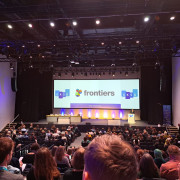- Science News
- Frontiers news
- Ellen Blaak – Motivation and drive are the secret ingredients
Ellen Blaak – Motivation and drive are the secret ingredients
Author: Leticia Nani Silva
Professor Ellen Blaak is the chair of the department of Human Biology at Maastricht University in The Netherlands and her research focuses on gut-adipose tissue-muscle metabolism. She is also a member of the Dutch Health Council and advises the government and parliament on public health and medical research matters. Her passion and motivation for Nutrition is unprecedented, and Ellen is keen to share how she has sculpted her academic path to lead up to her fantastic career.

Tell us about your work and how you have established yourself as a woman within your field.
“My academic background is in nutrition which has always been the focal point of my work. I am heavily interested in how we can prevent diseases such as obesity. I started off in The Netherlands and followed on with some field work in Cambridge, UK. Finally, I was fortunate enough to find a PhD position in The Netherlands, and here I am now, head of the department and leading cutting-edge research in a very important area of health.”
How do you think the recent pandemic has been shaping women in science?
“I think science work during the ongoing pandemic has seen a lot of changes having been already introduced, especially in funding. It is important to realize and take the most from these changes, as well as understand and embrace the impact on our research in the near and far future.
“With regard to difficulties, there is definitely the ‘working from home’ aspect. More families are having to stay at home and take care of children. However, compared to the previous generations, I believe there is a better balance between carrying on with the parental roles and professional obligations. Previously, it used to be very ‘one-sided’, whereas currently we can enjoy a mutually fulfilling balance.”
What challenges, if any, have you faced in your career? How have you overcome them?
“I think I have always been very motivated and driven to do well. I think with every career there is the initial struggle of establishing yourself in your role and bringing new ideas to the team. However, when I did manage to bring valid and recognizable innovative ideas into the group, I quickly found myself making a positive contribution to the department. Not so much a challenge rather a new perspective was presented to me after I had children. It is really special how one can prioritize time and also understand that you can progress an incredible amount in your career whilst still having the time to be a wonderful mother and a role model for your children.
“I think it’s also important to consider that the world of academia is ever-changing. We are moving into a transition period where it is not only about publications, CVs and H-indexes, etc. It is about the impact you make on your students, the new ideas you bring to the table and the collaboration you facilitate in your department. It is also about taking on leadership projects and participating in different working groups within your job. That is what makes a well-rounded scientist.”
If you had one word of advice to give to a young scientist, what would it be?
“I would definitely say to keep yourself motivated and really love what you do. It is important that you are passionate about your field of study and that you are always finding new ways to collaborate with your peers.”
Successful career progression is very often driven by motivation and passion. To achieve the wholesome balance, academia and ‘life’ achievements should go hand in hand while being equally important and fulfilling.

Frontiers is a signatory of the United Nations Publishers COMPACT. This interview has been published in support of United Nations Sustainable Goal 5: Achieve gender equality and empower all women and girls.








